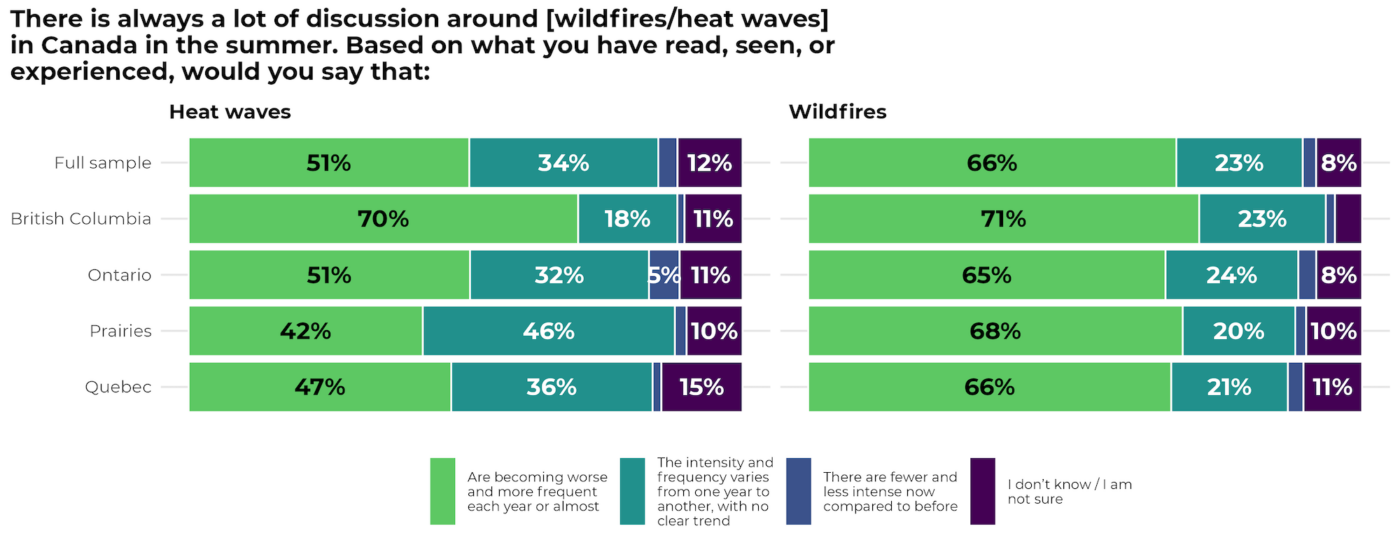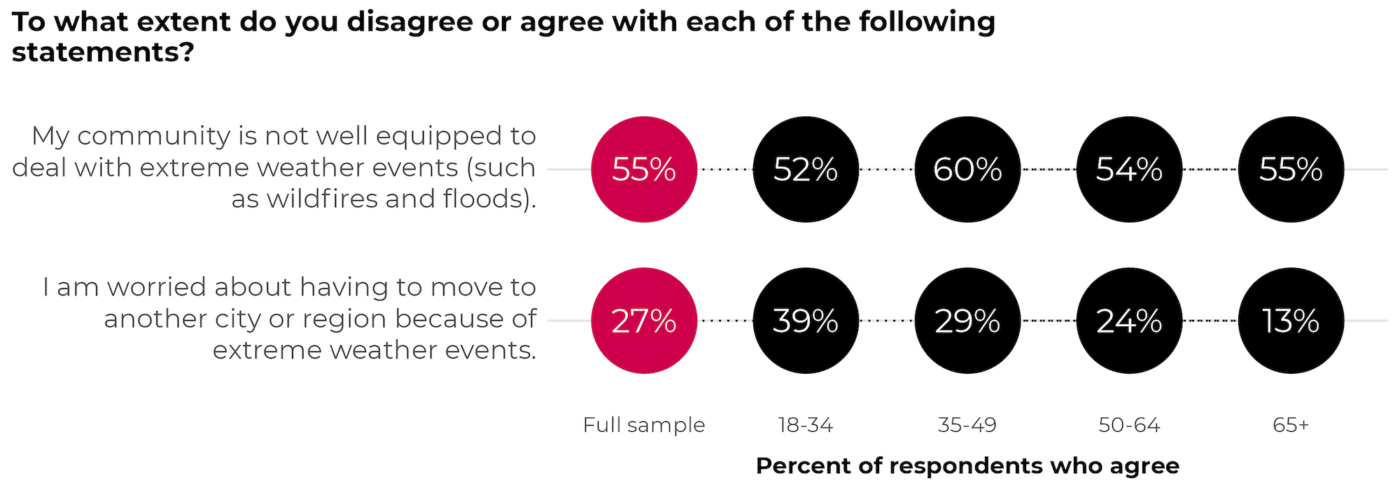Summer is coming… and so are wildfires?
May 14, 2024
Spring storms are bringing wind, rain, and even snow across Canada after a warmer than usual winter. While some of us might be missing sunny days, we may have forgotten how intense last summer was. The 2023 wildfire season in Canada was the worst in recorded history, with all provinces and territories affected and the wildfire smoke drifting as far as Western Europe, garnering widespread attention from both national and international media outlets.
Last year’s wildfire season in Canada resulted in more than double the area burned this year compared to the last 40 years. Between May and August, authorities had to issue multiple evacuation orders due to wildfires across the country. Heat waves were also a challenge in 2023, feeding wildfires and posing risks to vulnerable groups.
After Canada grappled with such an intense wildfire and heat wave season, we conducted a national study among 1,000 Canadians in October 2023 to track their opinions about these extreme weather events, our level of preparedness, and the future impact of these events on local communities.
We randomly asked half our sample about their perception of heat waves, and the other half about wildfires in Canada, to compare impressions of both climate events. More than half of respondents agreed that heat waves (51%) and especially wildfires (66%) are getting worse and more frequent each year or so, which suggests high levels of concern about these weather events.
Considering the visible destruction wildfires usually provoke and the multiple evacuation orders issued last season in Canada, it isn’t surprising that respondents appear more aware of the increases in wildfires. However, it’s worth noting that about 1 in 4 Canadians thinks that the intensity of wildfires varies from one year to another, with no clear trend over time.

Similarly, while heat waves are the deadliest form of extreme weather event in Canada, 1 in 3 respondents in our sample believe their intensity and frequency vary from one year to another, with no clear trend.
According to official records, the average summer temperatures have increased across all Canadian provinces over the past five decades, ranging from 0.5°C to 1.5°C more than in the 1970s. However, respondents’ perceptions of heat waves in the country vary significantly, with about half of Ontarians and Quebecers and up to 70% of British Columbians believing they are becoming worse and more frequent. Prairies respondents, in turn, are split: 42% think heat waves are worse and more frequent, and 46% consider the intensity and frequency vary from one year to another with no clear trend.
Moreover, with concerns over the growth of extreme weather events, we find that 55% of Canadians think that their communities are not well-equipped to deal with extreme weather events. In this context, respondents in BC and Quebec feel especially unprepared for such events (67% and 62%, respectively).

More than one in four Canadians is worried about these events amplifying to the point that they eventually have to move to another city or region; these fears of displacement are especially high among younger generations, with 39% of Canadians under 35 worrying about having to move eventually due to weather events. In contrast, only 13% of 65+ respondents show similar concerns. Compared to the full sample, British Columbians (32%) are slightly more concerned about future climate-related displacement.
Interestingly, respondents from rural areas are slightly less concerned about the possibility of climate-related displacement (21%) compared to those living in urban areas. This is in direct opposition to findings from Natural Resources Canada, which reports that rural communities in Canada will face “higher risks to health, safety and well-being from critical infrastructure decline or failure” due to climate change. This discrepancy could potentially be linked back to a lack of awareness — as events such as urban flooding or heat islands tend to receive heavy media attention — but also to ideological barriers in acknowledging the realities of climate change, as fewer respondents living in rural areas recognize that climate change is at least partly fuelled by human activity (81%) compared to urban respondents (89%).
Last summer, as Canadians were coming out of a summer marked by unprecedented extreme weather events, we found collective agreement that wildfires and heat waves are becoming more impactful and growing concerns, especially among the youth and in urban areas, of what these events could mean for our lives moving forward. As we head slowly towards the 2024 summer, seasonal forecasts predict a warmer-than-average spring throughout the country and BC has already issued its first wildfire evacuation order near Chetwynd.
Whether this coming summer brings some relief to communities impacted by extreme weather or intensifies concerns about our changing Canadian landscape, stay tuned with our omnibus tracking to find out where perceptions and concerns about extreme weather will sit by next fall.

